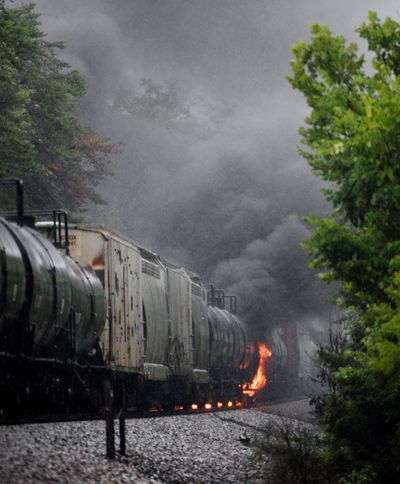Hazardous rail spill injures 52 in Tennessee

MARYVILLE, Tenn. – A CSX train car carrying hazardous material derailed and caught fire in the middle of the night in eastern Tennessee, forcing the evacuation of thousands of people and sending dozens to the hospital with respiratory issues and nausea.
The fire was still burning around noon Thursday, and officials said firefighters had been unable to get close to the burning car because of the heat. Blount County Mayor Ed Mitchell said there were also concerns that the fumes contained cyanide, a byproduct of burning the chemical acrylonitrile, which was leaking from the train car. The smoke had stopped by 6 p.m., however, Mitchell said.
About 5,000 people in the area were being evacuated, along with several businesses.
The damaged car was carrying liquid acrylonitrile, which officials said is a hazardous material used in multiple industrial processes including making plastics. It’s flammable and is dangerous if inhaled. The EPA says some effects of breathing acrylonitrile include headaches, dizziness, irritability and rapid heartbeat.
Fifty-two people were treated at Blount Memorial Hospital in Maryville, and 25 were admitted, hospital spokesman Josh West said. None had life-threatening injuries, but were experiencing respiratory issues, skin irritation and nausea, West said.
Ten first responders were treated at the hospital after breathing fumes.
The train was traveling from Cincinnati to Waycross, Georgia.
CSX regional vice president for state government affairs Craig Camuso said it had 57 cars and two locomotives, and that 27 cars carried hazardous chemicals: nine with acrylonitrile, 16 with propane and two with asphalt. He said the cause of the derailment is not yet known.